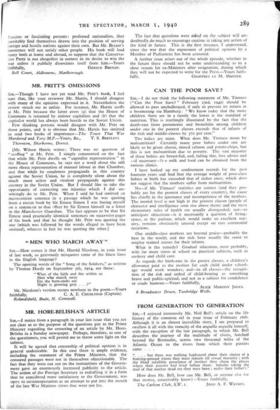CAN THE POOR SAVE ?
SIR,—I do not think the following statement of Mr. Titmuss (" Can the Poor Save? " February 23rd, 1940) should be allowed to pass unchallenged, if only to prevent its return as a boomerang via Hamburg : " We know today that the more children there are in a family the lower is the standard of nutrition. This is startlingly illustrated by the fact that the death-rate from pneumonia and bronchitis among children under one in the poorest classes exceeds that of infants of the rich and middle-classes by 572 per cent."
The italics are mine. What does Mr. Titmuss mean by malnutrition? Certainly many poor babies under one are likely to be given cheese, tinned salmon and potato-chips, but this is not malnutrition due to poverty. The vast majority of these babies are breast-fed, and, failing this, free advice and —if necessary—fr-e milk and food can be obtained from the various clinics.
I have looked up my confinement records for the past fourteen years and find that the average weight of poor-class babies at birth has exceeded that of richer ones; which does not suggest that the mothers suffer from malnutrition.
No—if Mr. Titmuss' statistics are correct (and they pro- bably are for the poorest classes of every country), the cause lies chiefly in the ignorance and incompetence of the mothers. The mental level is not high in the poorest classes (people of character and intelligence soon rise above them) and the most elementary rules of health are usually disregarded; nor—to anticipate objections—is it necessarily a question of living- space, as the parlour, which would make an excellent nur- sery, remains obstinately unused except on rare ceremonial occasions.
Our middle-class mothers are beyond praise—probably the best in the world; and the rich have usually the sense to employ trained nurses for their infants.
What is the remedy? Gradual education, most probably, with far more stress at school on practical subjects, such as cookery and child care.
As regards the birth-rate in the poorer classes, a children's allowance paid to the mother for each child under school- age would work wonders; and—in all classes—the recogni- tion of the risk and ordeal of child-bearing as something brave and public-spirited, and not as a subject for condolence or crude humour.—Yours faithfully,














































 Previous page
Previous page